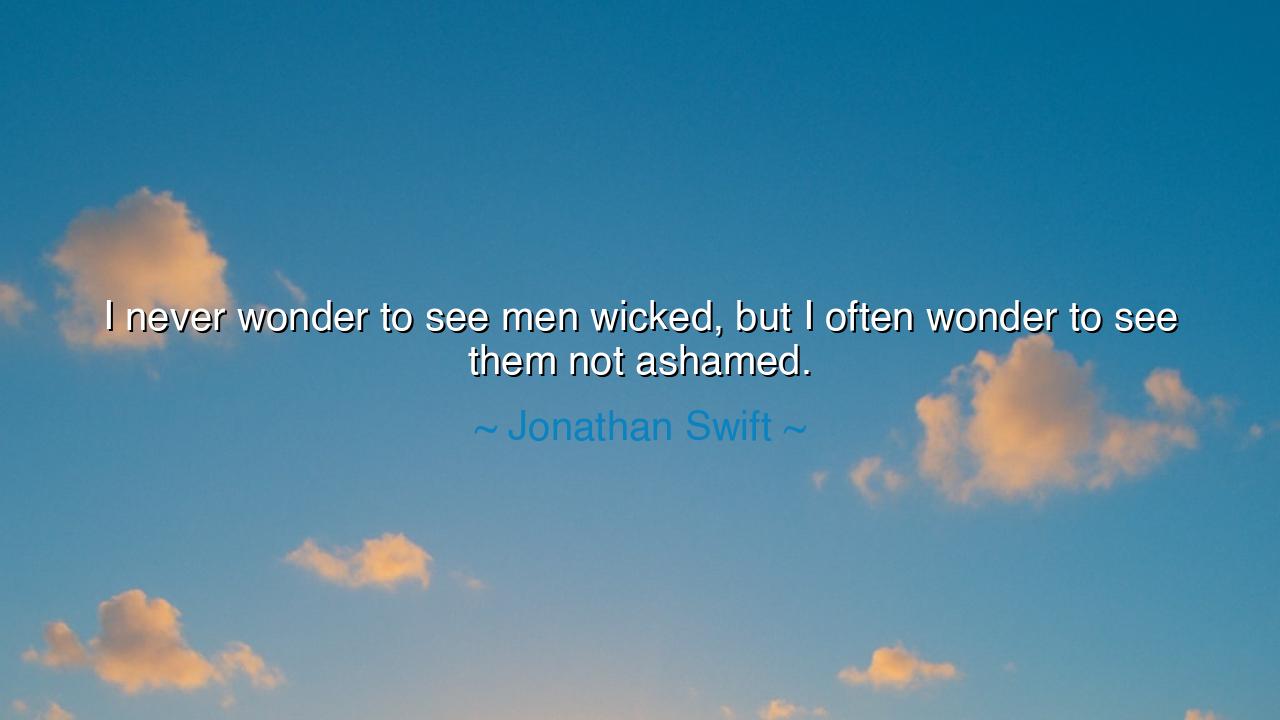
I never wonder to see men wicked, but I often wonder to see them






Jonathan Swift, that sharp and unyielding satirist of the eighteenth century, once wrote: “I never wonder to see men wicked, but I often wonder to see them not ashamed.” These words, born of a man who pierced hypocrisy with the lance of wit, echo across the ages. For he speaks of a truth well known to the ancients: that wickedness is common, as natural to fallen man as shadow is to light—but the absence of shame, that is the greater marvel, the deeper wound to the soul.
To be wicked is to stumble, to fall prey to greed, anger, lust, or pride. History is littered with such stumblings; every empire, every age, every household has seen its share of corruption. This does not surprise Swift, nor should it surprise us. But to act with cruelty and feel no sting, to lie with ease, to betray and yet hold the head high—this is the truest sign of decay. For shame is the guardian of conscience, the flame that warns us when we wander too far. Without it, a man becomes not merely sinful, but brazen, shameless, hardened like stone.
Consider the tale of the Watergate scandal. The crime itself—political wickedness—was no novelty, for corruption and intrigue had long walked the corridors of power. But what shocked the world was the attempt to deny, to excuse, to stand unashamed while the truth smoldered in plain sight. The scandal was not only in the act, but in the shamelessness of those who believed they might escape the fire of accountability. In this we see Swift’s wonder: the marvel is not that men fall into evil, but that they dare to walk there without blushing.
The ancients too understood this. The Greeks spoke of aidos, the sense of shame that guards men from dishonor. To lose it was to descend below humanity, to become as beasts, incapable of remorse. In Rome, the fall of the Republic came not merely through ambition, but through the loss of shame among senators who openly sold their votes and boasted of their corruption. The sin was expected; the shameless pride in sin was the greater calamity.
From this teaching springs a lesson for all ages: shame is not an enemy but a guide. It is the soul’s way of crying out, reminding us of the law written within. To feel shame is to remain human, to still hear the voice of conscience. But to lose shame is to sever that voice, to silence the whisper that restrains us from deeper ruin. Thus, the man who feels shame may yet return, but the shameless man marches unrepentant into destruction.
Therefore, O listener, cultivate not a heart of stone but of flesh. Do not despise shame, for it is the doorway to repentance. When you err, let yourself feel the sting—it is the fire that purifies, not the chain that binds. Do not let pride smother the blush that should rise to your cheek when you do wrong. For the blush is not weakness; it is proof that you still walk among the living, that your soul has not been silenced.
In practice, this means you must examine yourself with honesty. When you wrong another, do not cloak it with excuses, but let the shame teach you humility. When you see others boast of evil, do not be deceived by their laughter; know that shamelessness is a greater curse than the sin itself. And when you teach your children or guide your friends, remind them that to feel shame is no dishonor, but the first step back toward light.
So let Swift’s words be carried like a torch into your life: do not marvel at wickedness, for it is common. Marvel instead when men no longer feel ashamed of their wickedness. For in that loss, humanity itself begins to crumble. Hold fast to conscience, guard the flame of shame, and let it guide you always back to the path of truth. For the man who can still feel shame may yet rise; but the man without shame has already fallen beyond measure.






AAdministratorAdministrator
Welcome, honored guests. Please leave a comment, we will respond soon